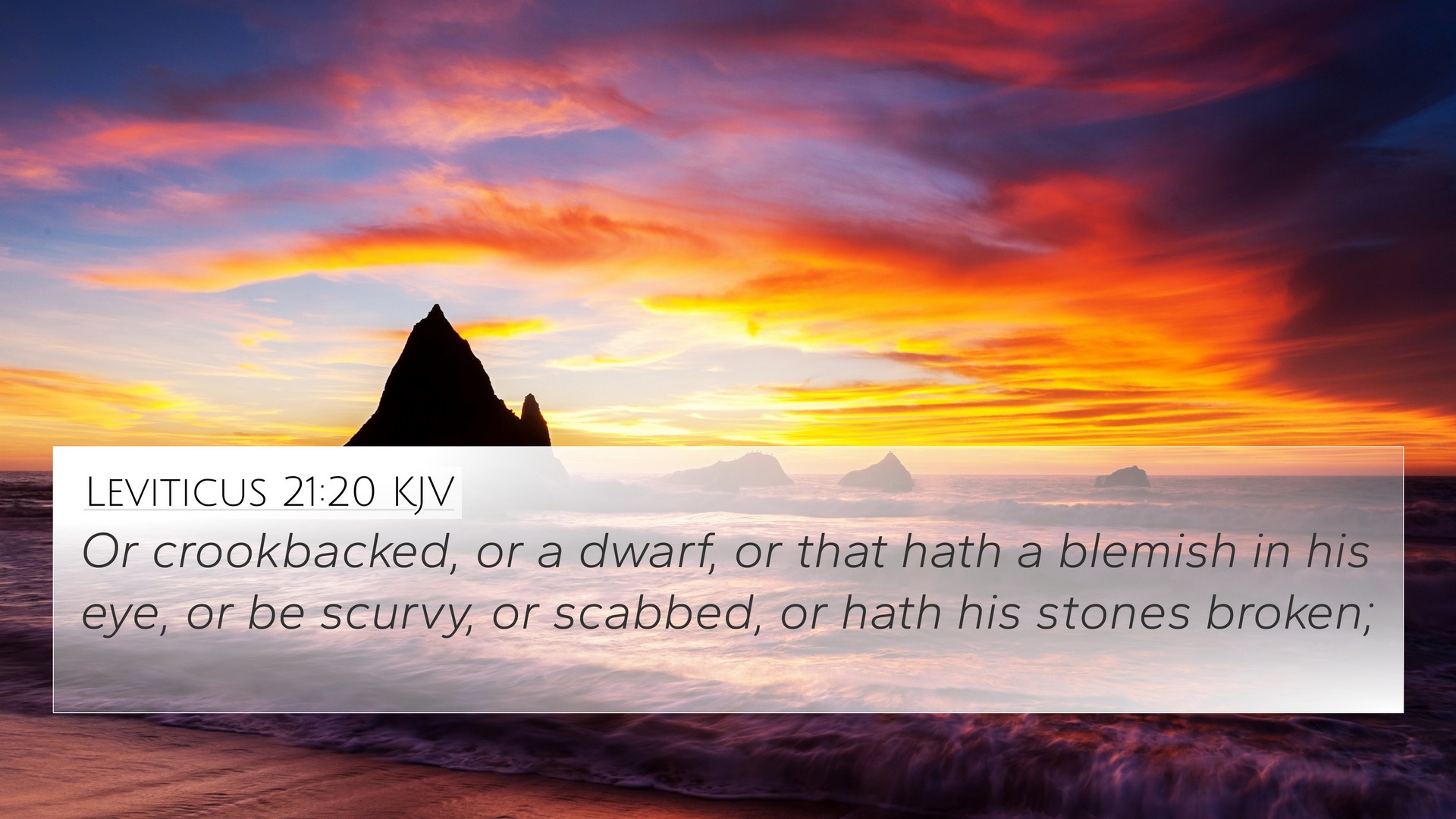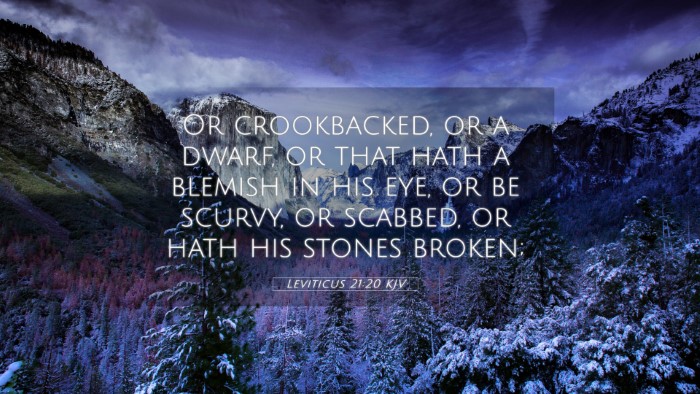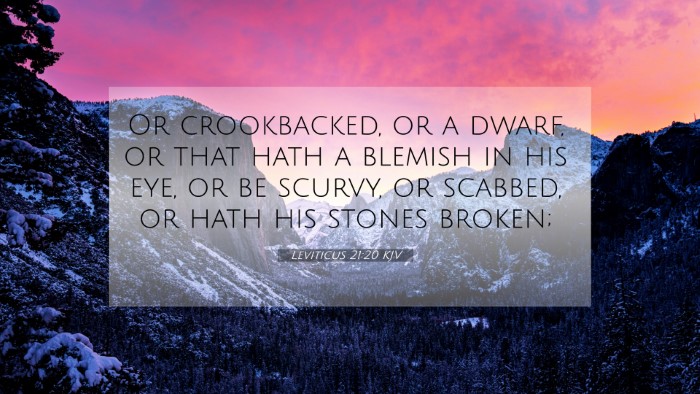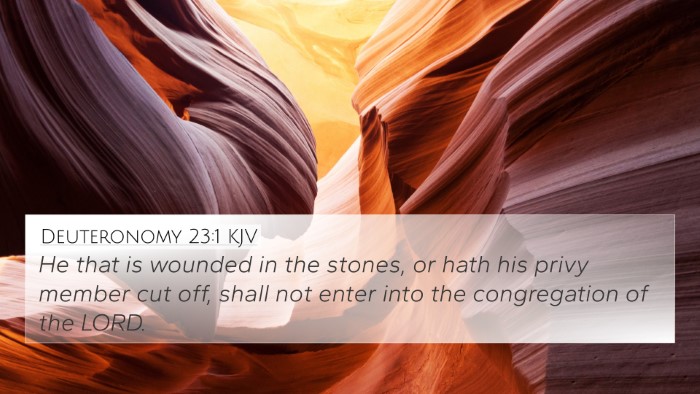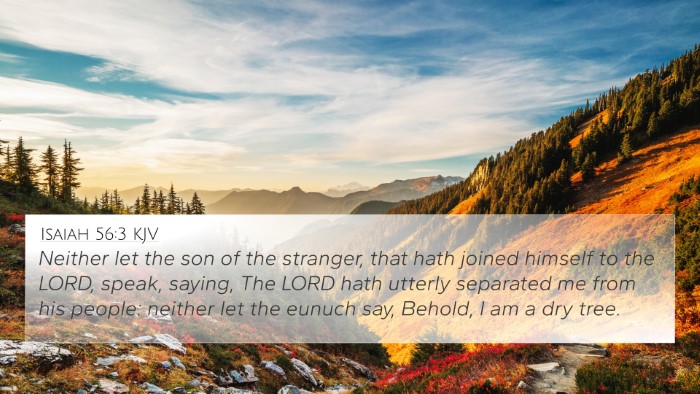Understanding Leviticus 21:20
Leviticus 21:20 states:
“Or crook-backed, or a dwarf, or that hath a blemish in his eye, or be scurvy, or scabbed, or hath his stones broken.”
This verse outlines specific physical blemishes that disqualify a priest from offering sacrifices. It serves as part of the wider regulations that govern the holiness expected of priestly figures in ancient Israel.
Summary of Biblical Meaning
This verse is a part of the Levitical code designed to maintain the sanctity and purity of the priesthood. The following insights from prominent public domain commentaries provide a deeper understanding:
-
Matthew Henry:
Matthew Henry emphasizes that the physical qualifications for priests indicate a deeper spiritual truth. The imperfections symbolize the need for spiritual purity when approaching God. None should serve in the priestly role unless they meet God’s standards, representing how God desires perfection in worship.
-
Albert Barnes:
Albert Barnes remarks that the mention of these blemishes serves to delineate the role of the priests. Their function was not merely to perform rituals but to embody the holiness of God. A priest embodies the connection between the people and God, and as such, should reflect divine standards.
-
Adam Clarke:
Adam Clarke points to the seriousness of these physical conditions and suggests they indicate unfit service. He discusses the idea that priests were chosen not only for their lineage but for their readiness to serve in a capacity that demanded physical representation of spiritual integrity.
Cross-References and Thematic Connections
Leviticus 21:20 is intricately connected to several other scripture passages that reinforce its themes of purity, holiness, and divine standards:
- Exodus 28:42: This passage outlines garments for the priests, emphasizing the need for them to present themselves appropriately before God.
- Leviticus 21:17-19: These verses detail other disqualifying conditions, further establishing the high standards of the priesthood.
- 1 Peter 2:9: In the New Testament, believers are called a royal priesthood, highlighting the enduring importance of holiness among God’s people.
- Hebrews 7:26: Discusses the need for a high priest to be sinless, just as physical blemishes disqualified priests in Levitical law.
- Isaiah 53:2: This verse refers to the Messiah having no stately form or appearance, showcasing that true value lies beyond physical attributes.
- Malachi 1:8: Calls for the best offerings to God, reinforcing the need to present oneself in the best possible condition, both physically and spiritually.
- Matthew 5:48: Jesus’s command to be perfect as God is perfect highlights the overarching call to holiness that stems from Old Testament laws.
Practical Application and Reflection
Understanding Leviticus 21:20 requires recognizing the call to holiness within one’s spiritual life:
- Spiritual Integrity: Just as the priests had to be without blemish, believers are called to pursue moral and spiritual integrity.
- Empathy for Others: Recognizing that physical attributes do not define one's worth before God encourages believers to support the marginalized.
- Significance of Service: Serving God requires a heart attuned to divine principles, recognizing that outward appearances are not as important as the inner condition of the heart.
Conclusion
Leviticus 21:20 serves as a powerful reminder of the holiness required of those who approach God on behalf of others. The connections with other biblical texts provide a broader understanding of the principles of purity and integrity expected in the worship of God. Through cross-referencing these scriptures, believers can gain a holistic view of God's expectations across both Testaments, enhancing their study and reflection of biblical themes.
Keywords: Bible verse cross-references, connections between Bible verses, thematic Bible verse connections, and more.
